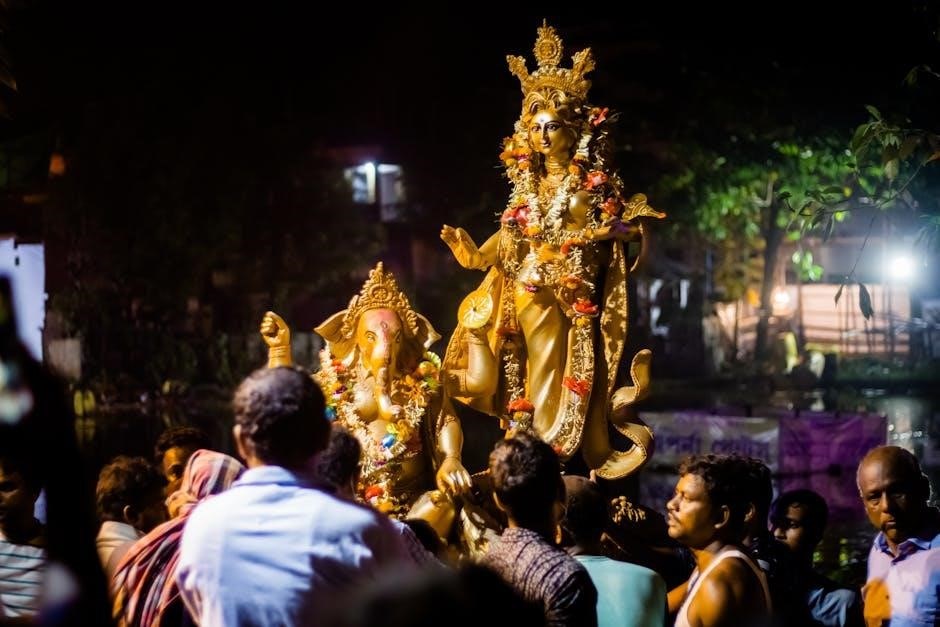Lakshmi Ashtothram is a revered devotional hymn comprising 108 sacred names of Goddess Lakshmi, symbolizing her divine attributes. It is a powerful prayer for prosperity, peace, and spiritual growth, often recited during pujas and auspicious occasions. The Telugu version of Lakshmi Ashtothram is widely cherished, offering devotees an accessible way to connect with the goddess and seek her blessings for a fulfilling life.
What is Lakshmi Ashtothram?
Lakshmi Ashtothram is a sacred Hindu devotional prayer dedicated to Goddess Lakshmi, the embodiment of wealth, prosperity, and good fortune. It consists of 108 divine names that extol her virtues and attributes, making it a powerful tool for spiritual and material well-being. The prayer is often recited during worship rituals and is believed to bring peace, prosperity, and divine blessings to the devotee. The Telugu version of Lakshmi Ashtothram is widely popular, offering devotees a meaningful way to connect with the goddess through its lyrical and spiritual verses. Chanting these 108 names is considered a complete worship, symbolizing the completeness and perfection associated with Goddess Lakshmi.
Significance of the 108 Names of Goddess Lakshmi
The 108 names of Goddess Lakshmi hold profound spiritual and philosophical significance, each name representing a unique attribute or virtue of the goddess. These names are not merely a list but a deep invocation of her divine presence, symbolizing her role as the bestower of wealth, knowledge, and spiritual enlightenment. The number 108 is considered sacred in Hinduism, representing completeness and the cyclical nature of existence. Chanting these names is believed to bring balance, prosperity, and inner peace, while also fostering devotion and a connection to the divine. The Telugu version of Lakshmi Ashtothram preserves this sacred tradition, allowing devotees to experience the transformative power of these revered names.

Benefits of Chanting Lakshmi Ashtothram
Chanting Lakshmi Ashtothram brings spiritual and material prosperity, fostering peace, wealth, and positive energy. It enhances focus, gratitude, and devotion, aligning one with divine abundance and inner harmony.
Spiritual and Material Prosperity
Chanting Lakshmi Ashtothram is believed to bring both spiritual and material prosperity. Spiritually, it fosters inner peace, clarity, and a deeper connection to the divine. Materially, it is thought to attract wealth, success, and stability. The 108 names of Goddess Lakshmi embody her divine attributes, each name symbolizing a unique aspect of her blessings. By reciting these names, devotees seek to balance their spiritual growth with worldly abundance. The practice is particularly revered for its ability to harmonize material aspirations with spiritual well-being, creating a holistic path to a fulfilling life. Many believers attest to experiencing positive transformations in their lives, reinforcing the hymn’s significance in Hindu devotion.
How Chanting Lakshmi Ashtothram Brings Peace and Wealth
Chanting Lakshmi Ashtothram is a powerful practice that brings peace and wealth by invoking the blessings of Goddess Lakshmi. It fosters mental and emotional harmony, creating an inner sense of calm and clarity. The 108 names symbolize divine attributes, each offering unique blessings that attract prosperity and good fortune. Regular chanting is believed to remove financial obstacles, enhance stability, and bring success in endeavors. Devotees often chant on Fridays, an auspicious day for Goddess Lakshmi, using japa mala beads to count the names, ensuring a complete and uninterrupted recitation. The Telugu PDF version makes it accessible for devotees to recite and download, facilitating daily worship and connecting them to the divine. This practice not only enhances spiritual growth but also invites material abundance, making it a holistic path to a balanced and fulfilling life. Many find comfort and prosperity through this sacred hymn, which is an integral part of Hindu devotion.

Lakshmi Ashtothram in Telugu PDF is a sacred devotional text containing the 108 names of Goddess Lakshmi. It is widely available for free download, offering devotees easy access to recite and worship. The PDF includes the Telugu lyrics of the Ashtothram, enabling spiritual seekers to chant and seek blessings for prosperity and peace. This document is a valuable resource for those who wish to connect with Goddess Lakshmi through her divine names and attributes, fostering a deeper spiritual connection and material abundance in their lives.
Overview of the Telugu Version
The Telugu version of Lakshmi Ashtothram is a sacred text containing the 108 names of Goddess Lakshmi, rendered in the Telugu language. It is a popular devotional resource, widely used by devotees to worship the goddess and seek her blessings. The Telugu PDF version is easily accessible online, allowing devotees to download and recite the hymn with ease. It is written in a clear and devotionally rich format, making it suitable for both experienced worshippers and newcomers alike.
The text includes the complete 108 names of Goddess Lakshmi, each highlighting her divine attributes and virtues. It is often chanted during puja ceremonies and auspicious occasions, helping devotees connect with the goddess and experience her grace. The Telugu version is particularly cherished for its linguistic and cultural relevance, making it a powerful tool for spiritual growth and material prosperity.
How to Download the Lakshmi Ashtothram Telugu PDF
To download the Lakshmi Ashtothram Telugu PDF, visit a reliable website or platform offering Hindu devotional texts. Search for “Lakshmi Ashtothram in Telugu PDF” using a search engine. Click on a trusted link, such as stotram.co.in or sakalam.org, which provides free downloads. Once on the page, locate the download option, usually marked clearly. Verify the source to ensure authenticity and safety. The PDF is typically lightweight, around 0.6 MB, making it quick to download. After downloading, you can easily access and recite the 108 names of Goddess Lakshmi in Telugu, benefiting from its spiritual and material prosperity.

Structure of Lakshmi Ashtothram
Lakshmi Ashtothram consists of an invocation to Goddess Lakshmi, followed by the recitation of her 108 sacred names in Telugu, encapsulating her divine attributes and blessings.
Invocation and the 108 Names
The Lakshmi Ashtothram begins with an invocation to Goddess Lakshmi, seeking her divine grace and blessings. This is followed by the recitation of her 108 sacred names, each embodying her celestial qualities. The invocation serves as a reverent opening, setting a sacred tone for the chanting. The 108 names, rich in spiritual significance, are believed to encapsulate her divine attributes, from prosperity to compassion. Devotees often use a japa mala to count the names, ensuring completion of the cycle. The structured format, starting with the invocation and proceeding through the names, creates a seamless and meditative experience, fostering deep spiritual connection and devotion to Goddess Lakshmi.
Importance of Completing the Full Cycle of 108 Names
Completing the full cycle of 108 names in Lakshmi Ashtothram is deeply significant, as each name embodies a unique aspect of Goddess Lakshmi’s divine attributes. The number 108 is considered sacred in Hindu spirituality, representing completeness and spiritual fulfillment. Reciting all 108 names ensures that the devotee connects with every facet of her divine energy, fostering holistic blessings. Interruptions or omissions may diminish the chant’s efficacy, while completing the cycle is believed to grant profound spiritual and material prosperity. Using a japa mala aids in maintaining focus and ensuring the cycle is completed, allowing the devotee to fully immerse in the divine vibration of the names, seeking peace, wealth, and divine grace.
Rituals and Puja Practices
Chanting Lakshmi Ashtothram is ideally performed on Fridays, an auspicious day for Goddess Lakshmi. Devotees use japa mala to count the 108 names, ensuring uninterrupted recitation for divine blessings and prosperity.
Auspicious Days for Chanting Lakshmi Ashtothram
Fridays are considered the most auspicious day for chanting Lakshmi Ashtothram, as it is dedicated to Goddess Lakshmi; Devotees also chant it on Purnima (full moon day) and Amavasya (new moon day) for enhanced spiritual benefits. Additionally, festivals like Diwali and Navaratri are ideal occasions to recite the Ashtothram, as they honor the divine feminine energy. Chanting on these days is believed to amplify the effects, bringing prosperity, peace, and blessings. Many followers also incorporate the practice into their daily puja routines for consistent spiritual growth and material well-being.
Using Japa Mala for Counting the Names
Using a Japa Mala (prayer beads) is a traditional and effective way to count the 108 names of Goddess Lakshmi while chanting the Ashtothram. The Japa Mala typically has 108 beads, representing the 108 names of the goddess, and is used to maintain focus and rhythm during the recitation. This practice helps devotees concentrate on the spiritual significance of each name, ensuring a seamless and uninterrupted completion of the cycle. The use of Japa Mala is deeply rooted in Hindu tradition and is believed to enhance the spiritual experience, fostering mindfulness and devotion. It serves as a powerful tool for connecting with the divine energy of Goddess Lakshmi and seeking her blessings for peace and prosperity.

Related Ashtothrams and Stotrams
Vaibhava Lakshmi Ashtothram and Maha Lakshmi Ashtothram are prominent stotrams dedicated to Goddess Lakshmi, offering additional pathways to seek her blessings for prosperity and spiritual growth.
Vaibhava Lakshmi Ashtothram
Vaibhava Lakshmi Ashtothram is a sacred hymn dedicated to Goddess Lakshmi, focusing on her divine attributes and the manifestation of her prosperity. This stotram is often recited alongside Lakshmi Ashtothram to enhance its spiritual impact. It emphasizes the goddess’s power to bestow wealth, fortune, and happiness, making it a popular choice for devotees seeking material and spiritual abundance. The Vaibhava Lakshmi Ashtothram is particularly noted for its ability to attract positive energy and ward off negativity, aligning with the broader themes of Lakshmi’s benevolence. Its recitation is believed to amplify the benefits of worship, offering devotees a deeper connection to the goddess’s grace and abundance.
Maha Lakshmi Ashtothram and Its Significance
Maha Lakshmi Ashtothram is a profound devotional hymn that glorifies Goddess Lakshmi, the embodiment of supreme wealth and prosperity. This sacred text is a compilation of 108 names, each highlighting a distinct virtue of the goddess, from her nurturing grace to her role as the remover of obstacles. Its significance lies in its ability to bring balance to one’s life by fostering both material and spiritual prosperity. Devotees believe that reciting Maha Lakshmi Ashtothram with sincerity attracts divine blessings, ensuring harmony and abundance. It is often chanted during specific rituals and is considered a powerful tool for invoking Lakshmi’s mercy and grace, making it a cornerstone of many spiritual practices aimed at achieving a fulfilling and peaceful life.
Lakshmi Ashtothram is a sacred hymn that embodies the essence of Goddess Lakshmi, offering devotees a path to prosperity, peace, and spiritual enrichment. Its significance endures as a timeless devotional practice.
Final Thoughts on the Importance of Lakshmi Ashtothram
Lakshmi Ashtothram holds profound significance as a devotion to Goddess Lakshmi, embodying her 108 divine attributes. Chanting it fosters spiritual growth, material prosperity, and inner peace. The Telugu version, widely accessible in PDF format, allows devotees to connect deeply with the goddess, seeking her blessings for wealth and harmony. Its recitation, particularly on auspicious days like Fridays, is believed to amplify its benefits. By chanting the full cycle of 108 names, devotees honor Lakshmi’s grace and wisdom, fostering a life of balance and fulfillment. This sacred hymn remains a timeless bridge between devotion and daily life, guiding followers toward a path of righteousness and abundance.
